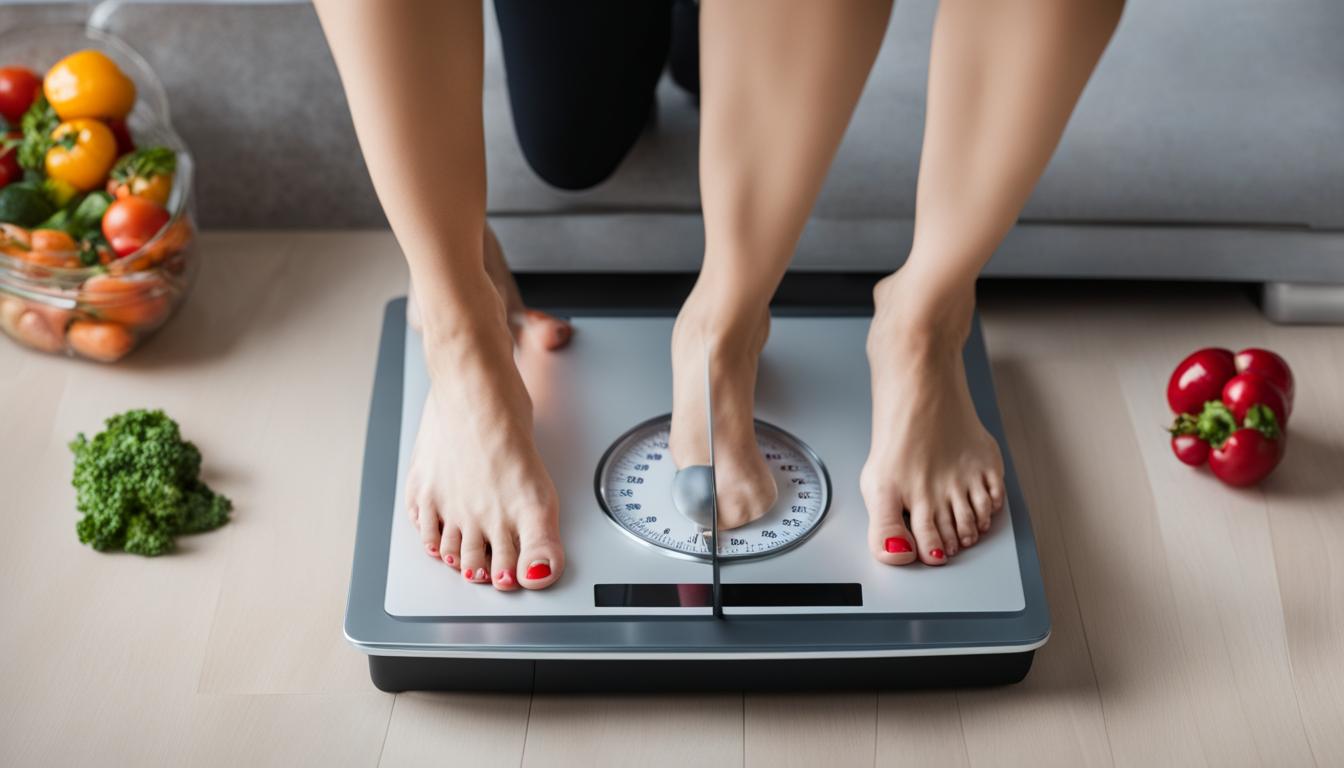Struggling to find a balance between work and weight loss? You’re not alone. Busy professionals often find it challenging to prioritize their health while juggling demanding work responsibilities. However, achieving work-life balance while sustaining weight loss is not impossible. With the right strategies and healthy habits, you can maintain a healthy lifestyle and achieve your weight loss goals, even with a busy schedule.
In this article, I will share effective tips and advice on managing work and weight loss, focusing on sustainable practices and maintaining a healthy lifestyle. By implementing these strategies, you can find a harmony between your work and fitness goals, ultimately leading to a more healthful life.
Key Takeaways:
- Find a balance between work and weight loss by implementing sustainable strategies.
- Prioritize self-care and make your health a priority.
- Focus on healthy habits for busy individuals and manage your time effectively.
- Establish a support system and stay motivated throughout your weight loss journey.
- Plan ahead and prioritize health by incorporating exercise and movement throughout your day.
Understanding Energy Balance and its Relationship to Weight Management
When it comes to weight management, understanding energy balance is key. Energy balance refers to the relationship between the calories consumed from foods and beverages and the calories used to support normal body functions and physical activity.
If you consume more calories than your body needs, you will experience weight gain. On the other hand, if you consume fewer calories than your body needs, you will see weight loss. It’s important to know your calorie needs and stay within that range to achieve your weight goals.
To put it simply, weight management is about finding a balance between the calories you consume and the calories you burn through daily activities and exercise. By being mindful of your energy balance, you can make informed choices about your diet and physical activity, ultimately leading to a healthier weight.
The Role of Energy Balance in Weight Management
To provide a clearer understanding, let’s break down the components of energy balance:
| Component | Explanation |
|---|---|
| Calories Consumed | The calories you consume from the foods and beverages you consume throughout the day. |
| Calories Used | The calories your body burns to support its normal functions and physical activity. |
| Weight Gain | When you consume more calories than your body needs, the excess energy is stored as fat, leading to weight gain. |
| Weight Loss | When you consume fewer calories than your body needs, your body taps into its stored fat for energy, resulting in weight loss. |
| Calorie Needs | The number of calories your body requires to maintain its current weight. |
By maintaining a balanced energy balance, you can manage your weight effectively and make progress towards your weight loss goals. Remember, small changes in your diet and physical activity can have a significant impact on your energy balance and overall weight management.
All Calories Are the Same Regardless of Food Source
Regardless of whether the calories come from a donut or a yogurt, a calorie is still a calorie. The body processes and uses calories as fuel, regardless of their food source. Carbohydrates are prioritized for immediate fuel, followed by protein and fat. It is essential to consume calories primarily from carbohydrates for immediate energy and include protein and fats in the diet as well. The USDA recommends that adults get 45-65% of calories from carbohydrates, 10-35% from protein, and 20-35% from fat.
| Caloric Source | Energy Yield (calories per gram) | Examples |
|---|---|---|
| Carbohydrates | 4 calories per gram | Bread, rice, pasta |
| Protein | 4 calories per gram | Chicken, fish, tofu |
| Fat | 9 calories per gram | Olive oil, avocados, nuts |

Nutrient Content Matters Alongside Calorie Intake
When it comes to weight loss, many people focus solely on calorie intake. While managing calorie intake is important, it’s equally important to consider the nutrient content of the foods we consume. A balanced diet that meets our nutrient needs is essential for healthy eating and successful weight loss.
Unlike donuts, which are high in calories and low in nutrients, nutrient-rich foods like yogurt offer a wide range of health benefits. Yogurt provides protein, calcium, and probiotics, which promote bone health, aid digestion, and support a healthy immune system. By including nutrient-rich foods in our diet, we not only support our weight loss goals but also enhance our overall well-being.
To ensure we’re getting the right balance of nutrients, it’s important to prioritize whole foods. Incorporating a variety of fruits, vegetables, whole grains, lean proteins, and healthy fats into our meals can provide the necessary vitamins, minerals, and antioxidants our bodies need. This approach to eating nourishes us from within, giving us the energy and vitality to thrive.
By focusing on nutrient-rich foods alongside managing calorie intake, we can achieve weight loss in a healthy and sustainable way. So, next time you’re planning your meals, think beyond calories and consider the nutrient content of the foods you choose. Your body will thank you.
Calorie Reduction and Exercise for Sustainable Weight Loss
To achieve sustainable weight loss, a combination of calorie reduction and regular exercise is essential. Numerous studies have demonstrated that a reduced calorie diet, when accompanied by exercise, leads to long-term weight loss and improved weight management. Whether you opt to cut carbohydrates, protein, or fat, the key is to create a calorie deficit. By finding a balance that aligns with your weight goals and fitness plans, you can enjoy your favorite foods in moderation while still achieving successful weight loss.
When it comes to calorie reduction, it’s important to focus on making gradual changes to your diet. Rather than drastically reducing your calorie intake, aim for a moderate calorie deficit that is sustainable in the long run. This approach allows your body to adjust and adapt to the changes, increasing the likelihood of maintaining your weight loss over time.
In addition to calorie reduction, incorporating exercise into your routine is crucial for sustainable weight loss. Regular physical activity not only helps burn calories but also boosts metabolism and supports overall health. Aim for at least 150 minutes of moderate-intensity aerobic activity or 75 minutes of vigorous-intensity aerobic activity each week, along with muscle-strengthening exercises on two or more days.
Sample Reduced Calorie Diet and Exercise Plan:
| Meal | Calorie Reduction Strategy | Exercise |
|---|---|---|
| Breakfast | Swap sugary cereals for whole-grain options. Include protein-rich foods like eggs or Greek yogurt. | 30 minutes of brisk walking or cycling |
| Lunch | Choose salad or lean protein options instead of calorie-dense meals. Include plenty of vegetables. | Strength training exercises focusing on major muscle groups |
| Snack | Opt for fresh fruits or raw vegetables instead of high-calorie snacks. | 10 minutes of moderate-intensity cardio, such as jumping jacks or jogging in place |
| Dinner | Control portion sizes and choose lean protein sources. Include a variety of colorful vegetables. | 30 minutes of aerobic exercise, such as swimming or dancing |
| Snack | Enjoy a small portion of a healthy snack, such as a handful of nuts or a piece of dark chocolate. | 10 minutes of flexibility exercises, such as yoga or stretching |
Remember, achieving sustainable weight loss is not just about following a reduced calorie diet and exercising regularly. It’s crucial to listen to your body, pay attention to hunger cues, and make nutritious food choices. Additionally, staying hydrated, getting enough sleep, and managing stress levels are important components of a healthy weight loss journey. By adopting a holistic approach that encompasses both calorie reduction and exercise, you can achieve your weight loss goals while maintaining a healthy and balanced lifestyle.

Adjusting Caloric Intake for Increased Physical Activity
When incorporating exercise into your routine, it is crucial to adjust your caloric intake to account for the increased calories burned. While it may be tempting to indulge in high-calorie foods as a reward for exercising, it is important to focus on consuming nutritious options that adequately fuel the body.
Lean protein, whole grains, and healthy fats are excellent choices, providing the necessary nutrients to support physical activity and maintain a balanced energy balance.
Food Choices for Increased Physical Activity
It is essential to make mindful food choices that complement your increased physical activity. Here are some nutrient-rich options to consider:
- Lean Protein: Include sources such as chicken breast, turkey, fish, tofu, and legumes to support muscle repair and growth.
- Whole Grains: Opt for whole wheat bread, quinoa, brown rice, and oats to provide sustained energy throughout your workouts.
- Healthy Fats: Choose sources like avocados, nuts, seeds, and olive oil to provide essential fatty acids and promote satiety.
By incorporating these foods into your diet, you can ensure that your body has the necessary nutrients to support physical activity while maintaining a balanced energy balance.
| Food | Calories | Protein (g) | Carbohydrates (g) | Fat (g) |
|---|---|---|---|---|
| Chicken Breast (4 oz) | 187 | 35 | 0 | 4 |
| Tofu (4 oz) | 80 | 9 | 2 | 4 |
| Quinoa (1/2 cup cooked) | 111 | 4 | 20 | 2 |
| Avocado (1/2 medium) | 120 | 1 | 7 | 10 |
Overcoming Challenges and Establishing Healthy Habits
When it comes to achieving long-term weight loss success, overcoming challenges and establishing healthy habits are key. It’s important to approach weight loss as a lifestyle change rather than a quick fix. Making small, sustainable changes to your daily routine can have a significant impact on your overall health and well-being. By setting realistic goals, focusing on nutrition, exercise, and support, and reinforcing positive habits, you can navigate the weight loss journey with ease.
- Start with small changes: Instead of completely eliminating certain foods or food groups, focus on making small changes to your diet. Swap sugary drinks for water, incorporate more fruits and vegetables into your meals, and choose whole grains instead of refined carbs. These small changes can add up over time and contribute to healthier eating habits.
- Set realistic goals: Setting achievable goals is crucial for maintaining motivation and seeing progress. Instead of aiming for drastic weight loss in a short period, break your goals down into smaller milestones. This not only makes them more attainable but also allows you to celebrate your accomplishments along the way.
- Embrace a balanced approach: It’s important to embrace a balanced approach to both nutrition and exercise. Instead of focusing on strict diets or intense workout regimens, prioritize nourishing your body with nutrient-rich foods and finding physical activities that you enjoy. This will make it easier to stick to your healthy habits in the long run.
“The journey of a thousand miles begins with a single step.” – Lao Tzu
Remember, establishing healthy habits takes time and patience. It’s important to be kind to yourself and recognize that progress is not always linear. Don’t be discouraged by setbacks, but instead, use them as opportunities to learn and grow. Surround yourself with a supportive network of friends, family, or professionals who can offer guidance and encouragement along the way.
Benefits of Establishing Healthy Habits
| Physical Health | Mental Health | Weight Management | Overall Well-being |
|---|---|---|---|
| Improved energy levels | Reduced stress and anxiety | Sustainable weight loss | Increased self-confidence |
| Reduced risk of chronic diseases | Enhanced mood and mental clarity | Improved body composition | Enhanced quality of life |
| Stronger immune system | Improved sleep quality | Boosted metabolism | Greater sense of fulfillment |
Establishing healthy habits is not just about weight loss; it’s about taking control of your overall health and well-being. By making small changes and setting realistic goals, you can develop sustainable habits that will positively impact every aspect of your life.
With determination and a willingness to adapt, you can overcome any weight loss challenge and establish healthy habits that will last a lifetime. Remember, it’s not about perfection; it’s about progress. Stay committed, stay motivated, and empower yourself to achieve your weight loss goals on your own terms.
Planning Ahead and Prioritizing Health
When it comes to successfully managing work and weight loss, planning ahead and prioritizing health are essential. By incorporating meal planning, healthy meal prep, and making mindful choices, you can fuel your body with nutritious foods while saving time.
Meal planning is a valuable tool that allows you to map out your meals in advance, ensuring that you have a variety of delicious and nutritious options on hand. Not only does it help you stay organized, but it also promotes healthier choices and eliminates the stress of deciding what to eat at the last minute.
“Meal planning is like having a personal chef – it takes the guesswork out of what to eat and ensures you’re nourishing your body with wholesome foods.”
When creating your meal plan, focus on incorporating whole foods into your diet. Whole foods, such as fruits, vegetables, lean proteins, and whole grains, are rich in essential nutrients, vitamins, and minerals. By choosing these nutrient-dense options, you’ll provide your body with the fuel it needs to thrive.
A balanced breakfast sets the tone for the rest of your day, providing you with the energy and nutrients necessary for optimal productivity. Make sure to include a mix of protein, healthy fats, and carbohydrates to keep you feeling satisfied and focused. Some breakfast ideas include a vegetable omelet with whole grain toast, Greek yogurt topped with fresh berries and granola, or overnight oats with nuts and seeds.
When it comes to time management, effective planning is crucial. Dedicate a specific time each week to meal prep, ensuring that you have healthy meals and snacks readily available. Invest in reusable containers to portion out your meals, and consider pre-cutting fruits and vegetables for easy snacking. By setting aside time for meal preparation, you’ll save time during busy weekdays and reduce the reliance on less healthy convenience options.
Don’t forget to prioritize protein in your meals and snacks. Protein is an essential macronutrient that plays a crucial role in weight management. It helps reduce cravings, keeps you feeling fuller for longer, and supports muscle growth and repair. Incorporate lean sources of protein such as chicken, turkey, fish, beans, and tofu into your meals to promote satiety and support your weight loss goals.
By integrating these strategies into your daily routine, you’ll be able to prioritize your health while successfully managing work and weight loss. Planning ahead, fueling your body with whole foods, enjoying a balanced breakfast, and incorporating protein-rich options will contribute to your overall well-being and make your journey towards a healthier lifestyle more enjoyable.
Squeeze in Exercise and Incorporate Movement Throughout the Day
Even with a busy schedule, it is important to prioritize time-efficient exercise and incorporate movement throughout the day to stay active and maintain a healthy lifestyle. You don’t need to spend hours at the gym to reap the benefits of physical activity. By finding creative ways to incorporate movement into your daily routine, you can make a significant difference in your overall health and weight loss journey.
To make exercise time-efficient, consider breaking your workouts into smaller increments that can be done throughout the day. For example, you can try doing a quick 10-minute workout in the morning, taking a brisk walk during your lunch break, and doing some stretching exercises in the evening. These short bursts of exercise can add up and contribute to your daily physical activity goal.

In addition to dedicated exercise sessions, prioritize movement in your daily activities. Instead of taking the elevator, opt for the stairs whenever possible. Park your car at a farther distance from your destination to incorporate more walking. Set reminders to take short breaks throughout the day and do some stretching or light exercises. Even simple activities like gardening, cleaning the house, or playing with your kids can contribute to your physical activity level.
By finding time-efficient exercise strategies and incorporating movement throughout the day, you can stay active despite a busy schedule. Remember, every bit of physical activity counts towards maintaining a healthy lifestyle and supporting your weight loss goals.
Staying Motivated and Accountable
When it comes to achieving long-term weight loss success, staying motivated and accountable are key factors. It’s normal to have ups and downs along the journey, but with the right mindset and support system, you can stay on track and reach your goals. Here are some tips to help you stay motivated and accountable:
- Establish a Support System: Surround yourself with friends, family, or professionals who will provide encouragement and hold you accountable. Having a support system can make a significant difference in your weight loss journey.
- Set Smaller Goals: Instead of focusing solely on your end goal, break it down into smaller, achievable milestones. Setting smaller goals will give you a sense of accomplishment along the way and maintain your motivation.
- Track Your Progress: Keep a record of your progress by tracking your weight, measurements, or fitness achievements. Seeing your progress visually can serve as positive reinforcement and keep you motivated to continue.
- Get Inspired: Remind yourself of why you started your weight loss journey in the first place. Whether it’s improving your health, boosting your confidence, or setting an example for your loved ones, remembering your initial motivation can help you overcome obstacles.
- Adopt Healthy Habits: Focus on adopting healthier habits that align with your weight loss goals. This can include making nutritious food choices, finding enjoyable forms of exercise, and practicing self-care. When you prioritize your well-being, you’ll feel more motivated to stay on track.
Remember, staying motivated and accountable is a continuous process. Embrace the journey and celebrate even the smallest victories along the way. By implementing these strategies, you’ll be better equipped to overcome challenges, stay committed to your health goals, and achieve sustainable weight loss.
Ways to Stay Motivated and Accountable
| Strategies | Benefits |
|---|---|
| Establishing a support system | Encouragement and accountability |
| Setting smaller goals | Sense of accomplishment and motivation |
| Tracking progress | Positive reinforcement and visual representation of achievements |
| Getting inspired | Reconnecting with initial motivation and overcoming obstacles |
| Adopting healthy habits | Enhanced overall well-being and long-term success |
Self-Care and Prioritizing Your Health
Prioritizing self-care is crucial for achieving work-life balance and long-term weight loss success. As a busy professional, it can be easy to neglect your own well-being. However, taking time for yourself, practicing stress management techniques, getting enough rest, and staying committed to your health goals are essential for maintaining a harmonious and fulfilling life.
Why Self-Care Matters
Self-care is not selfish; it is an investment in your overall productivity, creativity, and quality of life. By prioritizing your health, you are better equipped to handle the demands of your work and personal life. When you take care of yourself, you have more energy, focus, and resilience to tackle challenges and achieve your goals.
“Self-care is giving the world the best of you, instead of what’s left of you.” – Katie Reed
Stress Management for a Balanced Life
Stress is a common factor in today’s fast-paced world, but it doesn’t have to consume you. Incorporate stress management techniques into your daily routine to create a sense of calm and balance. This could include practicing mindfulness or meditation, engaging in regular physical activity, or finding activities that bring you joy and relaxation.
The Importance of Rest
Rest is often overlooked but essential for maintaining your physical and mental well-being. Make sure to prioritize sleep and create a bedtime routine that promotes relaxation. Set boundaries around your work schedule to allow for downtime, and don’t be afraid to take breaks throughout the day to recharge.
Sticking to Your Health Goals
When it comes to weight loss, consistency is key. Create a plan that aligns with your lifestyle and includes healthy eating habits and regular exercise. Use meal prepping and planning to ensure you have nutritious options readily available. Stay committed to your health goals by tracking your progress, seeking support from loved ones, and celebrating your achievements along the way.
Making Self-Care a Daily Practice
Incorporate self-care into your daily routine by scheduling time for activities that nourish your mind, body, and soul. Whether it’s reading a book, practicing yoga, or enjoying a long bath, find activities that bring you joy and make self-care a top priority. Remember, taking care of yourself is not optional but essential for living a balanced and fulfilling life.
| Benefits of Self-Care | Ways to Practice Self-Care |
|---|---|
| Reduces stress and anxiety | Set personal boundaries |
| Increases energy and productivity | Engage in hobbies or activities you love |
| Improves physical and mental well-being | Practice mindfulness or meditation |
| Enhances self-esteem and self-worth | Get enough quality sleep |
| Builds resilience and coping skills | Take breaks throughout the day |

Conclusion
Achieving work-life balance while successfully managing weight loss requires finding a balance and implementing sustainable strategies. By understanding energy balance and prioritizing nutrient-rich foods, we can fuel our bodies while managing calorie intake. Regular exercise and establishing healthy habits are key to maintaining a healthy lifestyle while juggling work responsibilities.
Staying motivated and seeking support are crucial for long-term success. With the right strategies, we can achieve sustainable weight loss and maintain a balanced and healthy lifestyle. Remember to prioritize self-care and make your health a priority. By doing so, you can overcome challenges and find harmony between work and weight loss goals.
Remember, achieving work-life balance is possible. By implementing these tips and strategies, we can find a balance between our professional responsibilities and our health. Let’s prioritize our well-being and maintain a healthy lifestyle while juggling the demands of our busy lives.
FAQ
What is energy balance and how does it relate to weight management?
Energy balance refers to the relationship between the calories consumed and the calories used to support normal body functions and physical activity. Consuming more calories than the body needs leads to weight gain, while consuming fewer calories than the body needs results in weight loss.
Are all calories the same, regardless of the food source?
Yes, a calorie is still a calorie, regardless of the food source. The body processes and uses calories as fuel, prioritizing carbohydrates for immediate energy, followed by protein and fat.
Does the nutrient content of calories matter for weight loss?
While all calories provide energy, not all calories are equal in terms of nutrient content. It is important to focus on a balanced diet that meets your nutrient needs in addition to managing calorie intake. Foods like yogurt provide additional nutrients such as protein, calcium, and probiotics, while donuts do not offer the same benefits.
What is the key to achieving sustainable weight loss?
To achieve sustainable weight loss, it is necessary to reduce calorie intake while maintaining regular exercise. Studies have shown that a reduced calorie diet accompanied by exercise leads to long-term weight loss. The key is to create a calorie deficit by finding a balance that works for your weight goal and fitness plans.
How should I adjust my caloric intake when incorporating exercise?
When incorporating exercise into your routine, it is crucial to adjust your caloric intake to account for the increased calories burned. While it may be tempting to indulge in high-calorie foods as a reward, it is important to focus on consuming nutritious options that adequately fuel the body.
What are some tips for overcoming challenges and establishing healthy habits?
Approach weight loss as a lifestyle change rather than a temporary fix. Focus on making small, sustainable changes rather than completely eliminating certain foods or food groups. Setting realistic and attainable goals, focusing on nutrition, exercise, support, and positive reinforcement can contribute to a stress-free and healthy weight loss journey.
How can I plan ahead and prioritize health while balancing work and weight loss?
Meal planning and prepping can save time and ensure that nutritious meals are readily available. Choosing whole foods and incorporating a balanced breakfast can fuel your body and set the stage for a day of healthy eating. Effective time management is essential for fitting in exercise and making health-conscious choices throughout the day.
How can I incorporate exercise into a busy schedule?
You don’t need to spend hours at the gym to reap the benefits of exercise. Breaking your workouts into smaller increments and prioritizing movement throughout the day can make a significant difference. Finding time-efficient exercise strategies and staying active will contribute to your overall health and weight loss journey.
How do I stay motivated and accountable for my weight loss goals?
Having a support system can provide encouragement and help keep you on track. Setting smaller goals throughout the process and tracking your progress can serve as positive reinforcement and keep you motivated. Remembering your initial reasons for wanting to lose weight and adopting healthier habits can provide the necessary motivation to overcome obstacles and stay committed.
How important is self-care in achieving work-life balance and weight loss?
Prioritizing self-care and making your health a priority are essential for achieving work-life balance and long-term weight loss success. Taking time for yourself, practicing stress management techniques, getting enough rest, and sticking to your health goals will provide you with the energy and motivation needed to fulfill your daily responsibilities.
How can I achieve work-life balance while managing weight loss?
By understanding energy balance, focusing on nutrient-rich foods, reducing calorie intake, prioritizing exercise, and establishing healthy habits, you can maintain a healthy lifestyle while juggling work responsibilities. Staying motivated, seeking support, prioritizing self-care, and making your health a priority are key factors in achieving work-life harmony and sustainable weight loss.

